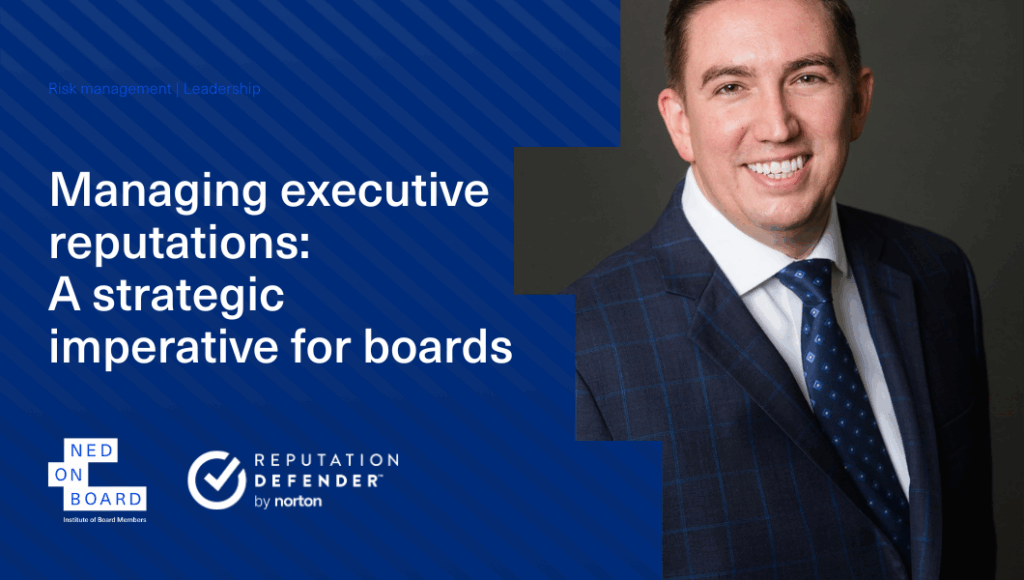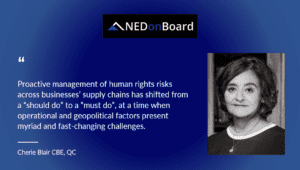The board’s role in protecting executive credibility and corporate success
The personal online reputations of senior executives are more visible and scrutinised than ever before. A leader’s digital footprint can significantly influence public perception of the organisation they represent. According to the 2024 Edelman Trust Barometer, 76% of institutional investors view a CEO’s personal reputation as an indicator of company trustworthiness.
For board members, ensuring that executives maintain strong, positive online reputations is about protecting individuals, as well as safeguarding the company’s long-term viability. This article delves into why board members must champion online reputation management (ORM) for their leadership teams and themselves and provides actionable insights into how to do so effectively.
Related resource: For more on managing the online reputation of non-executive directors, please click on the link:
Why executive reputations matter to companies
Investor and stakeholder confidence
The public perception of a CEO or senior executive often directly reflects on the company itself. A leader’s personal online presence can influence investor decisions and stakeholder trust.
Example: A CEO’s involvement in public controversy, be it a social media misstep or unfavorable personal news, can lead to reduced shareholder confidence, triggering a decline in share prices.
Customer loyalty
Consumers increasingly associate corporate brands with their leadership. A scandal involving a key executive can lead to boycotts or consumer distrust, especially in industries like retail, finance, or technology where ethical leadership is paramount.
Talent retention and recruitment
Reputational issues within leadership can make companies less attractive to top-tier talent. A 2023 survey by PwC found that 35% of employees would reconsider working for a company if its leadership faced a reputational scandal.
Case study: Credit Suisse leadership scandals
Credit Suisse’s repeated leadership scandals, including the resignation of CEO Tidjane Thiam over a spying controversy, significantly damaged its reputation. These events led to client losses, a dip in share prices, and increased scrutiny from regulators.
💡Insight for boards:
Proactive ORM and crisis management could have mitigated the reputational damage, preserving stakeholder trust.
Why this is a board-level priority
Reputation risk equals business risk
A damaged executive reputation can lead to material losses for the company. For example, a leadership scandal can result in:
- Share price decline: Public controversies often lead to selloffs by investors.
- Regulatory scrutiny: Executives facing reputational challenges may attract additional scrutiny from UK regulators, such as the Financial Conduct Authority (FCA).
Example: Studies show that companies experience an average share price drop of 5-10% following high-profile leadership scandals. For a FTSE 100 company, this could equate to millions in lost market value.
💡Insight for boards:
Reputational risk is not an abstract concept: it directly impacts the company’s bottom line and operational stability. Boards must treat online reputation management as an element of enterprise risk management. This involves implementing frameworks to monitor executive reputations and their alignment with corporate values, as well as establishing rapid response protocols for mitigating potential crises.
Talent retention and employee attrition
Employee loyalty is closely tied to their trust in leadership. When executives face reputational issues, it not only affects the external perception of the company but also causes internal disruptions. This risk is even more pronounced in sectors where employee retention and engagement directly influence business outcomes, such as technology, financial services, and healthcare.
💡Insight for boards:
Proactively managing executive reputations helps maintain a positive internal culture, reinforcing the company as a desirable place to work. Online reputation management can be a key tool in retaining top talent and fostering a stable, motivated workforce.
Leadership reputations amplify company values
Positive executive narratives help reinforce the company’s mission and cultural ethos. For example, CEOs who champion diversity or sustainability initiatives online enhance the company’s reputation in those areas.
💡 Insight for boards:
Executives are the face of a company’s values. Boards must ensure their public and online actions align with corporate goals, such as sustainability or diversity. By proactively managing and amplifying positive executive narratives, boards can strengthen the company’s brand, build stakeholder trust, and position the organisation as an industry leader.
How board members can guide online reputation management (ORM) for executives
Establish a governance framework for ORM
- Develop clear ORM policies for executives that outline expectations for their digital presence, social media activity, and public commentary.
- Create an internal ORM task force to monitor and manage potential risks tied to executive reputations.
Conduct regular digital footprint audits
- Partner with ORM professionals to assess the online presence of key executives. This includes reviewing search engine results, social media accounts, and any mentions in public forums.
- Proactively identify outdated, irrelevant, or negative content that could harm the company’s image.
Embed ORM into executive development programs
- Incorporate reputation management training into executive onboarding and leadership development initiatives.
- Emphasise the importance of aligning personal narratives with corporate values.
Monitor and respond to reputational risks
- Use real-time monitoring tools to track mentions of executives in media and social platforms.
- Develop a crisis response plan to address issues swiftly and consistently, minimising long-term damage.
ORM as a strategic asset
For UK board members, managing the online reputations of company executives is not a secondary concern: it is a strategic necessity. By embedding ORM into governance frameworks and proactively supporting leadership teams, boards can protect their organisations from reputational risks while reinforcing trust with stakeholders.
Key questions for UK board members
- Do we have a governance framework in place for monitoring and managing executive reputations?
- How prepared are we to respond to a reputational crisis involving a member of the leadership team?
- Are our executives’ personal narratives aligned with the company’s values and strategic goals?
- Have we conducted a recent audit of our leadership team’s online presence to identify potential risks?
Managing executive reputations is complex and requires specialised expertise. Companies like ReputationDefender provide tailored ORM services, including digital footprint audits, real-time monitoring, and crisis response strategies. Partnering with such experts can help boards safeguard leadership reputations and, by extension, the long-term success of their organisations.
References
Edelman. (2024). Trust Barometer.
Deloitte. (2023). Connected Consumer Study.
URM. (2024). Analysis of Fines Imposed by the Information Commissioner’s Office in 2023
PwC. (2023). Workforce Hopes & Fears Survey.




